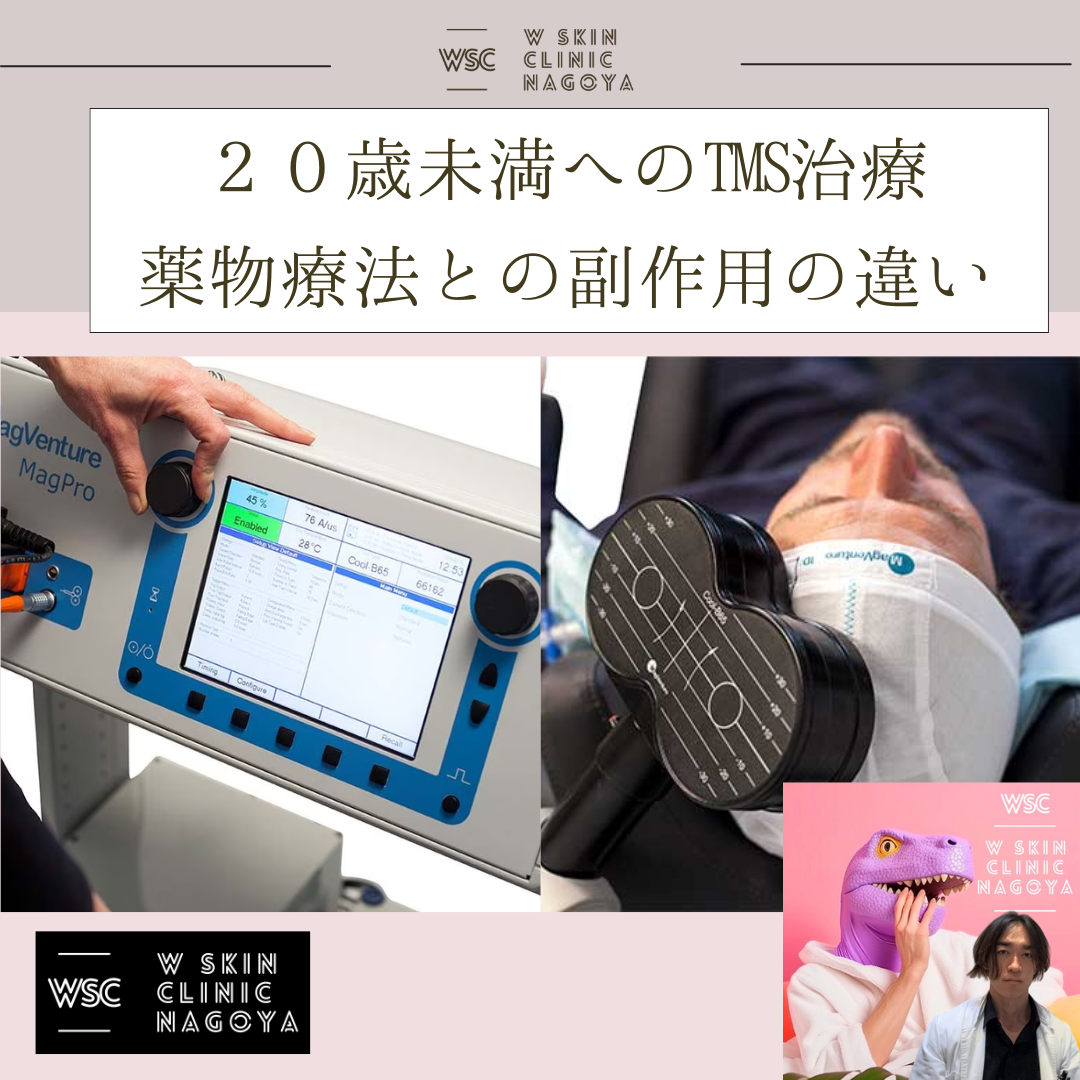NEWSお知らせ
2024.11.24|ブログ
20歳未満に対するTMS治療の有効性について、薬物療法と比較して副作用は少ないか?名古屋の美容皮膚科医が解説

20歳未満に対するTMS治療の有効性について、薬物療法と比較して副作用は少ないか?名古屋の美容皮膚科医が解説
こんにちは、Wスキンクリニック名古屋、院長の加藤晃司です。
今回は、20歳未満に対するTMS治療の有効性について、薬物療法と比較して副作用は少ないか?について解説します。
TMS治療(経頭蓋磁気刺激法)は、うつ病やADHD、不安症などの精神疾患に対する非侵襲的治療法として注目されていますが、20歳未満の若年層への適応については、大人と同じく効果が期待される一方で、研究がまだ限られているため、慎重に使用されています。以下に、TMS治療の20歳未満への有効性と、薬物療法と比較した際の副作用について詳細に説明します。
- TMS治療の基本的な仕組みと若年層への適応
TMS治療は、頭部に磁気コイルを当て、脳の特定部位に磁場を作用させることで、神経活動を調整する治療法です。特に、うつ病や不安症、ADHDの症状改善が報告されており、20歳未満の若年層でも一定の効果が期待されています。TMSは、脳の神経回路に刺激を与えることで、神経伝達物質のバランスを整え、症状を軽減させる効果があると考えられています。
- 若年層に対するTMS治療の有効性
20歳未満の若年層に対するTMS治療の有効性は、主に以下のような精神症状において期待されています。
うつ病:特に薬物療法に抵抗性のあるうつ病に対して、若年層でもTMS治療が効果を示したケースがあります。
ADHD(注意欠陥・多動性障害):TMSが集中力や注意力を向上させ、衝動的な行動を抑える効果が報告されています。副作用が少ないため、薬物療法に代わる選択肢として注目されています。
不安障害やPTSD:脳の不安を司る部分に作用し、若年層の不安症状やPTSDの症状軽減にも効果があるとされています。
研究例では、若年層でのTMS治療が安全で効果的であるとされており、特に薬物療法が効かない場合の代替治療として有効性が示唆されていますが、長期的な効果や安全性についてのデータはまだ限られているため、治療に際しては慎重なアプローチが求められます。
- TMS治療と薬物療法の副作用の比較
① TMS治療の副作用
TMSは、一般的に非侵襲的かつ副作用が少ない治療として知られています。特に若年層のように、長期的な薬物投与による副作用が懸念される場合には、TMS治療は安全な代替手段となり得ます。
主な副作用:
頭痛:TMS治療後に一時的な軽い頭痛が生じることがありますが、通常は治療が進むにつれて軽減します。
局所的な不快感:治療部位にわずかな刺激やピリピリした感覚を感じることがありますが、痛みはほとんどありません。
まれな副作用:稀に発作(けいれん)が報告されていますが、頻度は極めて低く、発作のリスクが高い場合には予防的な措置を取ることが可能です。
TMSは長期的な副作用がほとんど報告されていないため、若年層においても安全に使用できると考えられています。
② 薬物療法の副作用
若年層に対する薬物療法では、主に抗うつ薬や抗不安薬、ADHD治療薬が使用されますが、これらには以下のような副作用が見られることがあります。
抗うつ薬:抗うつ薬の使用により、体重増加、倦怠感、性機能障害、眠気などの副作用が見られることがあります。また、若年層においては一部の抗うつ薬が自殺リスクを増加させる可能性が示唆されており、慎重な観察が必要です。
抗不安薬:抗不安薬(ベンゾジアゼピン系)は依存性のリスクが高く、長期使用によって離脱症状が生じる可能性があります。若年層では依存症リスクが特に高まるため、長期間の使用は推奨されません。
ADHD治療薬:ADHD治療薬(メチルフェニデートなど)は食欲不振、不眠、成長遅延などの副作用があるため、特に成長期にある若年層への影響が懸念されます。
これらの点から、薬物療法は即効性があるものの、長期的な使用による副作用や依存リスクがあるため、特に20歳未満の若年層においてはリスクと効果を十分に考慮した上での使用が必要です。
- TMS治療のメリットと薬物療法との使い分け
TMS治療のメリット
非侵襲的かつ低リスク:TMS治療は、脳に直接作用しますが外科的な処置は不要で、体全体に作用する薬物療法と異なり、副作用が少ない点が大きなメリットです。
依存リスクがない:TMS治療には依存性がなく、薬物のような長期間の摂取による依存や離脱症状の心配がありません。
安全性:若年層への適用においても、安全性が高いため、薬物療法が困難な患者や、副作用が懸念される場合に適した治療法です。
薬物療法のメリット
即効性が高い:一部の抗うつ薬や抗不安薬は、比較的早期に効果が現れるため、急な症状に対応する際に有用です。
広範囲な効果:薬物療法はTMSよりも広範囲に作用し、全身にわたって神経伝達物質のバランスを調整できるため、さまざまな症状に対応できます。
使い分けのポイント
軽度から中程度の症状:TMS治療は軽度から中程度の症状に効果を発揮し、薬物療法が不要な場合には優先されることが多いです。
薬物療法の効果が不十分な場合:TMSは薬物療法に対する抵抗性のあるうつ病や、薬物療法の副作用が懸念されるケースで、代替治療または併用療法として選択されます。
長期治療を避けたい場合:特に若年層の場合、長期的な薬物療法を避けたい場合には、TMS治療の短期集中治療が効果的です。
- 結論
20歳未満に対するTMS治療は、非侵襲的で安全性が高く、副作用も比較的少ないため、特に薬物療法に抵抗がある場合や、薬物の副作用リスクを回避したい場合に効果的な選択肢です。
若年層においても効果が期待できる一方で、まだ長期的なデータが少ないため、治療を行う際には、専門医による慎重な診断とフォローアップが必要です。薬物療法とTMS治療のどちらが適しているかは、患者ごとの状態や症状の重さに合わせて、医師と相談しながら最適な治療法を選ぶことが大切です。
TMS治療はこちら
https://www.w-clinic-nagoya.com/tms
Wスキンクリニック名古屋でのエクソソーム治療はこちら
https://www.w-clinic-nagoya.com/acne/exosome
NMN点滴はこちら
https://www.w-clinic-nagoya.com/beauty-drip/nmn
高濃度ビタミンC点滴はこちら
https://www.w-clinic-nagoya.com/beauty-drip/vitamin-c
*当院では
NMNは一般社団法人NMN医療研究会、エクソソームはセルソース株式会社のM2P-エクソソームを使用しています。
当院では無料でスタッフカウンセリングを行なっております。
お気軽にご予約くださいませ
Wスキンクリニック名古屋 (美容皮膚科)
https://www.w-clinic-nagoya.com/
〒461-0005 愛知県名古屋市東区東桜 2-4-1 第3コジマビル6F
TEL 052-7377-7117(10:00~19:00)
LINE ID @w.nagoya
高岳駅より徒歩4分 / 新栄町駅より徒歩5分
お車でお越しの方
名鉄協商パーキングチケットをお渡しいたしますので、クリニック近くのパーキングをご利用ください。
ご予約、お問合せ、Wスキンクリニック名古屋公式LINEからも可能です。
LINE ID : @w.nagoya
友達追加は↓から
Wスキンクリニック名古屋公式インスタ↓
https://www.instagram.com/w.skinclinic.nagoya?igsh=NHhoODFnaXB2b2ll&utm_source=qr
Wスキンクリニック院長 加藤晃司インスタ↓
https://www.instagram.com/w.skin.nagoya.kojikato?igsh=aW9nbWZwNjNjZ3pz&utm_source=qr
On the Effectiveness of TMS Treatment for Individuals Under 20: Is it Less Prone to Side Effects Compared to Pharmacotherapy?
Hello, this is Dr. Koji Kato, Director of W Skin Clinic Nagoya.
Today, I will discuss the effectiveness of Transcranial Magnetic Stimulation (TMS) therapy for individuals under 20 and whether it has fewer side effects compared to pharmacological treatments.
What is TMS Therapy, and How Does it Apply to Young Individuals?
TMS therapy is a non-invasive treatment that uses magnetic fields to stimulate specific regions of the brain, particularly those associated with mental health disorders like depression, anxiety, and ADHD. For individuals under 20, it offers promising potential as a treatment that avoids the systemic side effects often associated with pharmacotherapy. By modulating neural activity, TMS helps restore balance in brain function, which can alleviate symptoms of mental health disorders.
Effectiveness of TMS Therapy for Young Individuals
Conditions Benefiting from TMS Therapy
Depression: TMS has shown efficacy in treating depression resistant to traditional pharmacotherapy, even in younger patients.
ADHD: Studies indicate that TMS can improve attention, focus, and impulse control, presenting a viable alternative to medications with notable side effects.
Anxiety Disorders and PTSD: By targeting regions of the brain responsible for fear and anxiety, TMS can reduce symptoms associated with these conditions.
While limited, existing research on young individuals suggests that TMS is both safe and effective for these conditions. However, long-term studies are still needed to solidify its role in this age group.
Comparing Side Effects: TMS vs. Pharmacotherapy
Side Effects of TMS
TMS therapy is known for its minimal side effects, particularly in younger populations:
Common Side Effects: Mild headaches and temporary discomfort at the treatment site, which typically diminish as therapy progresses.
Rare Side Effects: Very rare instances of seizures have been reported, but the risk is extremely low when proper protocols are followed.
Long-term Safety: TMS does not involve systemic exposure, making it a safer option for long-term use in individuals under 20.
Side Effects of Pharmacotherapy
Pharmacological treatments, while effective, are associated with a higher risk of side effects, particularly in younger patients:
Antidepressants: Common side effects include weight gain, fatigue, sleep disturbances, and, in some cases, increased risk of suicidal thoughts in adolescents.
Anti-anxiety Medications: Benzodiazepines may cause dependency and withdrawal symptoms, making them less ideal for long-term use in young individuals.
ADHD Medications: Stimulants like methylphenidate can lead to appetite suppression, sleep disturbances, and, in some cases, growth delays.
Advantages of TMS Therapy for Young Individuals
Non-Invasive and Low-Risk
TMS does not involve medication ingestion or invasive procedures, reducing the overall burden of side effects and risks.
No Dependency or Withdrawal
Unlike many psychotropic medications, TMS does not pose a risk of dependency or withdrawal symptoms.
Targeted Treatment
TMS acts directly on specific brain regions, avoiding the systemic effects of pharmacotherapy.
When to Choose TMS Over Pharmacotherapy
Mild to Moderate Symptoms: TMS is a viable first-line treatment for younger individuals with mild to moderate symptoms of depression or ADHD.
Medication Resistance: For those who do not respond to medications, TMS provides an alternative.
Avoiding Long-Term Medication: In cases where long-term pharmacotherapy is undesirable, TMS offers a shorter, focused course of treatment.
Concluding Thoughts
TMS therapy is a promising option for individuals under 20, offering a non-invasive and low-risk alternative to pharmacotherapy. While its long-term efficacy in younger populations requires further study, it provides significant advantages in terms of safety and side-effect profile. As with any medical treatment, the choice between TMS and pharmacotherapy should be personalized, taking into account the severity of symptoms, individual preferences, and medical history.
If you or your child are considering treatment options for mental health conditions, consult with a specialist to determine the most suitable approach for your needs. At W Skin Clinic Nagoya, we provide expert guidance on the latest treatment modalities tailored to your unique circumstances.




